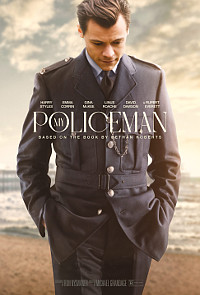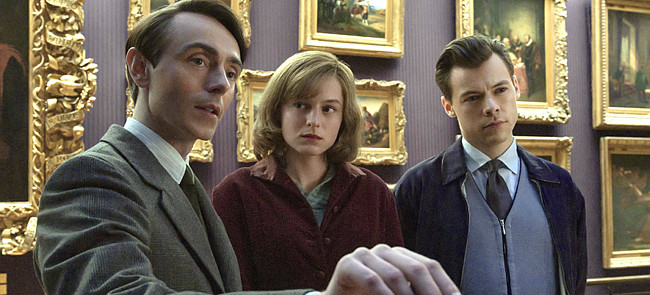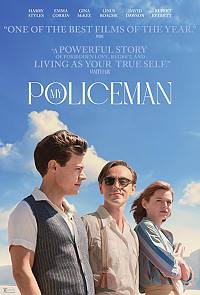| SHADOWS ON THE WALL | REVIEWS | NEWS | FESTIVAL | AWARDS | Q&A | ABOUT | TALKBACK | |||||
|
My Policeman
Review by Rich Cline |
| |||||
 dir Michael Grandage scr Ron Nyswaner prd Greg Berlanti, Philip Herd, Cora Palfrey, Robbie Rogers, Sarah Schechter with Harry Styles, Emma Corrin, David Dawson, Gina McKee, Rupert Everett, Linus Roache, Kadiff Kirwan, Emily John, Dora Davis, Joseph Potter, Freya Mavor, Maddie Rice release US 21.Oct.22, UK 4.Nov.22 22/UK Amazon 1h53 


TORONTO FILM FEST  Is it streaming? |
 Because there's such a compelling story at the centre of this British drama, it is packed with strikingly emotional and provocative moments. But the filmmaking is oddly timid, thinning the material in a way that makes it feel soapy. Set in two intriguing periods, the premise raises important issues that deserve attention. So more nuance in the characters and storytelling could have provided an even more potent kick. On the South Coast in 1998, retired teacher Marion (McKee) takes in old friend Patrick (Everett), who is recovering from a severe stroke. But Marion's husband Tom (Roache) avoids going anywhere near Patrick. Flash back to 1957, as Marion (then Corrin) and policeman Tom (Styles) are in a budding romance alongside their mutual friend, museum curator Patrick (Dawson). As they hang out together, Marion becomes increasingly aware that there's something going on between the two men, but the true depth of their passion only becomes apparent 40 years later as she reads Patrick's journals. Flickering around in time, Nyswaner's script reveals details only when it's ready, echoing British resistance to speak about issues of the heart. This leaves several layers of the story missing in action, most notably the four decades between the two periods. It's as if these three people lived in stasis during that time. Without this needed texture, the character arcs feel incomplete and the feelings melodramatic, even though the underlying events carry proper weight. Thankfully, Grandage finds beautifully tactile imagery that personalises the experience. Performances are a bit limited by this approach, which centres on surface reactions rather than deeper interaction. McKee, Roache and Everett have terrific moments in their slightly truncated scenes, evoking the lingering tensions between these three entangled people. Corrin, Styles and Dawson have a bit more to play with in their beautifully designed sequences, which spiral around to reveal both of Tom's relationships with genuine affection while hinting at a close connection between Marion and Patrick. The film's most powerful observation is in its comparison of the two periods, one in which homosexuality is a crime punishable by imprisonment and worse, and another in which same-sex couples can thrive in society. So there are some lovely moments that touch on how people in the 1950s did the best they could in a difficult situation, and perhaps there are few regrets later in life. But as these characters get the chance to reset their lives, there's a strong glimmer of hope.
R E A D E R R E V I E W S 
 Still waiting for your comments ... don't be shy.
Still waiting for your comments ... don't be shy.
|
||||
© 2022 by Rich Cline, Shadows on the Wall | |||||
| HOME | REVIEWS | NEWS | FESTIVAL | AWARDS | Q&A | ABOUT | TALKBACK | |||||

